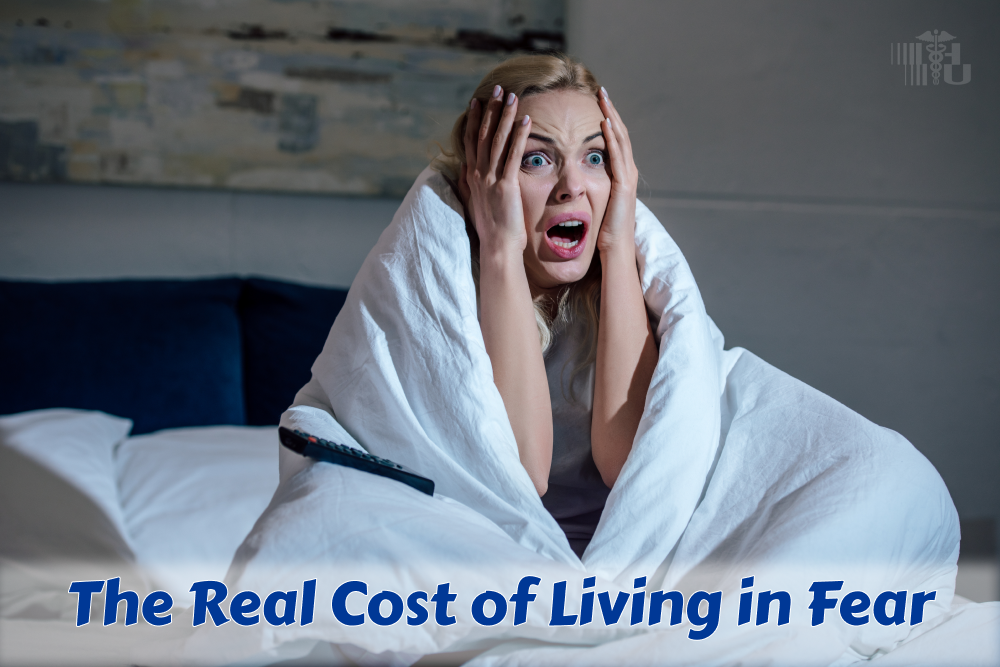In the present age of social media, you may access whatever information you want. Hearing the deluge of health news and illnesses is very uncommon—warnings and views of people regarding bad habits and the awareness of chronic diseases. Nowadays, we live our lives to gain social exposure in every aspect. Everyone is afraid of leading a Terrible lifestyle and getting sick because health is so important, and this has a direct effect on our mental health.
A mental stress cycle is naturally triggered when you start to fear chronic illnesses. Additionally, it affects your physical symptoms, including headaches, stomach issues, and sleep disturbances. The constant worry about one’s health can eventually result in mental health conditions like depression or generalized anxiety disorder, which can lower one’s quality of life.
The Fear of Disease: A Growing Concern
This illness, which we refer to as health anxiety or hypochondria, is becoming more and more prevalent in today’s generation and can make you feel too depressed to take care of your health.People who suffer from health anxiety may perceive a shared physical experience as a dangerous sickness. This anxiety is not limited to severe and fatal illnesses; it also extends to minor illnesses, which exacerbate anxiety and depression. Psychological strain might result from continuously monitoring and checking your body.
Health anxiety can become a self-fulfilling prophecy for specific individuals. They frequently visit the doctor, incessantly monitor their symptoms online, and mistakenly believe that every minor illness is a serious one. An ongoing concern for one’s health can lead to a cycle of stress, anxiety, and depression.
Key Signs of Health Anxiety
- Persistent anxiety about getting a major illness, even when tests reveal no problems.
- Examining your body frequently for symptoms of disease, such as rashes, lumps, or variations in heart rate.
- Being constantly unsatisfied despite going to the doctor or asking others to certify your health.
- Ignoring medical facilities, physicians, or health-related news for fear that it will confirm or exacerbate a disease.
- Interpreting typical physical symptoms, such as headaches, exhaustion, and muscle twitching, as indicators of serious illness.
- Despite medical assurances or negative test findings, the fear of sickness either endures or returns rapidly.
- Searching for symptoms online all the time (a behavior frequently referred to as “cyberchondria)
- When the anxiety gets so bad, it interferes with relationships, job, and daily activities.
A Bad Lifestyle: The Psychological Toll of Poor Habits
Workload hurts everyone’s lifestyle because people are not exercising, eating poorly, and sleeping poorly. Chronic stress can also directly cause mental health problems like anxiety, depression, and stress. These unhealthy behaviors have an influence on your emotional health in addition to your physical health. According to mental health professionals, such as psychiatrists, psychologists, and therapists, a lousy lifestyle may lead to chronic stress and anxiety. These bad lifestyle decisions eventually lead to a vicious cycle in which mental health conditions exacerbate bad habits, making it harder for people to stop the pattern.
1) Poor Nutrition: The effects of eating an imbalanced diet on mental health can be profound. Studies have shown that diets high in processed foods and sugar are associated with melancholy, anxiety, and cognitive impairment. Deficiencies in specific nutrients, particularly vitamins B12, D, and omega-3 fatty acids, have been associated with mood problems. Lack of vital nutrients can cause the body to become exhausted, irritable, and have difficulty focusing, all of which have a detrimental effect on mental health.
2) Lack of Exercise: Not only can physical inactivity harm the body, but it also hurts the psyche. It’s well known that regular exercise releases endorphins, which are feel-good and stress-relieving chemicals. Sedentary lifestyles put people at greater risk for mood disorders like anxiety and sadness. Lack of exercise can also result in weight gain, a negative body image, and feelings of inadequacy, all of which can be factors in low self-esteem.
3) Sleep Deprivation: Today’s generation demands late working hours to improve their personal and professional lives. They are also continuously connected to social media, which causes them sleep deprivation and negatively affects their mental health.
4) Substance Abuse: Pressure from a hectic job and a break from life’s issues These days, many people abuse drugs, alcohol, and over-caffeine. These things could temporarily provide individuals with a sense of relief. However, addiction to substances may make mental health problems worse.
Mental health professionals, including psychiatrists, psychologists, and therapists, claim that fear of illness can cause all of these issues that could affect general health. Adhere to the breaking cycle to enhance and advance your physical and emotional well-being.
Breaking the Cycle of Stress: Strategies for Physical and Mental Well-being
Restoring mental and physical equilibrium requires addressing the dread of illnesses and bad lifestyle choices. The following actions can help stop the cycle and enhance mental health.
Adopt a Holistic Approach
Being healthy requires more than just eating healthy and working out every day. It all comes down to scheduling time for self-care practices like yoga, stress reduction, and mindfulness exercises like meditation.
Create Healthy Routines
Establish modest, doable objectives for your nutrition, exercise, and sleep. Making healthy adjustments gradually is frequently more maintainable than completely transforming one’s lifestyle.
Mindful Media Consumption
Reduce the amount of media you consume to avoid supporting narratives built on fear. Find reliable information sources that provide helpful advice for preserving health without generating fear-based narratives..
Build a Support System
Make an effort to engage with friends, family, and other individuals who can provide you with emotional support, motivate you through health anxiety, and assist you in making life adjustments.
Seek Professional Help
Contact a mental health expert, such as a psychiatrist, psychologist, or therapist, if your anxiety is too much to handle your fear of illness. They may offer you integrated care tailored to your specific needs.
Harmony United Psychiatric Care, Florida, provides essential care with our professional and board-certified team of Psychiatrists, Psychologists, and Therapists. You obtain a secure and customized treatment for your mental health issues, including eating disorders, PTSD, bipolar disorders, stress, anxiety, depression, and OCD.
For more information about mental health conditions, visit our Mental Health Library page. To understand and cope with your major depressive disorder symptoms, get help from our top psychiatrists, psychologists, and therapists, who are known for providing the best mental health treatment and psychiatry services. To book an appointment, please call us at (800) 457-4573 or submit an appointment request.
FAQs Section
What difficulties individuals with mental health problems may face in day to day living?
Poor mental health can significantly affect daily functioning, personal relationships, social interactions, work performance, and financial stability. These challenges can increase stress and, if left unaddressed, may lead to more serious issues such as substance abuse, social isolation, deteriorating physical health, and even homelessness.
How does chronic disease affect mental health?
Individuals living with chronic conditions often need to adapt their goals, daily routines, and work life. While many go through a period of grieving before coming to terms with their situation, others may experience prolonged emotional distress, which can lead to mental health disorders—most commonly depression or anxiety.
What is the mental disorder where people lie about illnesses?
Munchausen syndrome, also known as factitious disorder, is a rare mental health condition in which a person deliberately pretends to be ill. This may involve lying about symptoms, exaggerating health problems, or even intentionally causing harm to themselves to appear unwell.
How do phobias affect people mentally?
Phobias can significantly interfere with daily life and may lead to intense anxiety or depression. Complex phobias—such as agoraphobia or social phobia—are especially likely to cause these effects. Individuals with phobias often go out of their way to avoid the situations or objects that trigger their fear and anxiety.
How do living conditions affect mental health?
Inadequate heating and air conditioning can negatively impact residents’ health. Cold indoor environments have been linked to increased blood pressure, respiratory issues, and a higher risk of depression.
How do diseases affect mental health?
Individuals with chronic illnesses are at a greater risk of developing depression. This can be triggered by various factors, including the anxiety, stress, and daily challenges that come with managing a long-term condition, as well as physical changes in the brain caused by certain diseases—such as Parkinson’s disease or stroke.
How does fear of disease affect mental health?
Constant fear of contracting diseases can lead to chronic anxiety, obsessive behaviors (like excessive handwashing or symptom checking), and even panic attacks. Over time, this fear can diminish one’s quality of life and cause social withdrawal or depression.
Can an unhealthy lifestyle contribute to poor mental health?
Yes. A sedentary lifestyle, poor nutrition, irregular sleep, and substance use can negatively affect brain chemistry, reduce resilience to stress, and increase the risk of mental health disorders like depression and anxiety.
Why is the fear of illness increasing, especially after the COVID-19 pandemic?
The pandemic heightened awareness of disease and mortality, exposing people to constant news updates and health alerts. This has led to increased health anxiety, also known as “illness anxiety disorder” or “health-related OCD” in some cases.
How can I tell if my fear of getting sick is excessive?
If your fear disrupts daily activities, causes significant distress, or leads to repetitive health-checking behavior without medical need, it may be excessive and could benefit from professional evaluation.
What are the mental health risks of a consistently unhealthy lifestyle?
A poor lifestyle can lead to hormonal imbalances, increased stress hormones like cortisol, and lower levels of mood-regulating neurotransmitters. This raises the risk of mood disorders, burnout, fatigue, and cognitive decline.
Can improving lifestyle habits reduce fear and anxiety?
Absolutely. Regular exercise, a balanced diet, adequate sleep, and mindfulness practices can boost mental resilience, regulate mood, and help manage anxiety, including health-related fears.
What strategies help manage fear of diseases?
Limit time spent consuming health news.
Practice mindfulness and relaxation techniques.
Stay informed through credible sources, not social media rumors.
Seek support from a therapist if the fear becomes overwhelming.
When should I seek professional help for fear of disease or unhealthy habits?
If your fears or habits interfere with your daily life, work, or relationships—or if you’re experiencing symptoms of anxiety, depression, or compulsive behavior—it’s a good time to consult a mental health professional.
Resource Websites:
https://www.nimh.nih.gov
https://www.mayoclinic.org
https://adaa.org



Leave a Reply